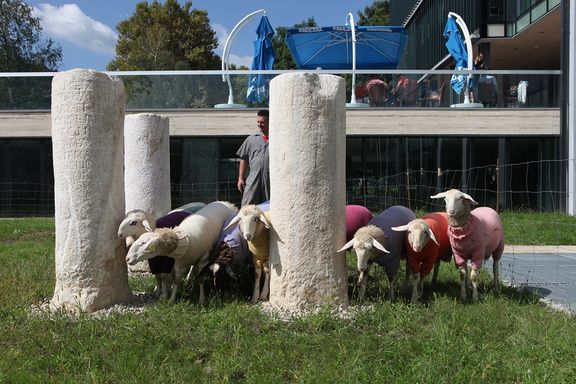Difference between revisions of "Celje Regional Museum"
Ivan Pirnat (talk | contribs) |
Ivan Pirnat (talk | contribs) |
||
| Line 14: | Line 14: | ||
| founded by = Celje Municipality | | founded by = Celje Municipality | ||
| opening hours = Duke's Manor: Tue to Fri 10am to 12am and 4pm to 6pm, Sat 10am to 12am | | opening hours = Duke's Manor: Tue to Fri 10am to 12am and 4pm to 6pm, Sat 10am to 12am | ||
| − | | opening hours = Old | + | | opening hours = Old Count's Mansion: Mar to Oct, 10am-6pm, Mon and holidays closed. Nov to Feb,10am-4pm, Sat 9am to 1pm, Sun, Mon and holidays closed |
| contacts = {{Contact | | contacts = {{Contact | ||
| name = Stane Rozman | | name = Stane Rozman | ||
Revision as of 13:42, 25 March 2010
-
to
15 Sep 2023
23 Nov 2023
Exhibition "Alma Maksimilijana Karlin - Authoress", showcasing the writer's life and work. In the scope of Slovenia – Guest of Honour Country at the Frankfurt Book Fair 2023 and made possible by Municipality of Celje, Slovenian Book Agency, Celje Regional Museum, Celje Museum of Recent History and Slovene Ethnographic Museum.
at the Frankfurt Book Fair
-
to
16 Sep 2021
18 Jan 2022
Alma M. Karlin - Alone Around the World, an exhibition prepared by the Celje Regional Museum, supported by the Ministry of Culture and Embassy of the Republic of Slovenia Vienna
-
to
5 May 2015
12 May 2015
ABC Arhivska Barbara Celjska, an exhibition from the collections of the Historical Archives Celje and Celje Regional Museum
Collections
The first part of the collection occupies an area of 240 square metres and presents eras from the Stone Age Potočka zijalka site to the late Roman period and the city of Celeia. A Roman lapidary collection with an area of 440 square metres in the cellars of the Old Counts' Mansion is supplemented with the outdoor lapidary collection of architectural remains of public and private buildings and a rich collection of milestones. In the Major Hall, the famous 'Celje Ceiling' in tempera on canvas (14.45m x 9.7m) is a singular example of secular painting from the turn of the 16th and 17th centuries in Slovenia. The museum also houses important Renaissance, Baroque, Rococo, Classicist, Empire, Biedermeier and Historicist paintings, sculpture, frescoes, furniture and furnishings, clocks, miniatures and portraits. The ethnological collection on the ground floor features a wide spectrum of exhibits belonging to the material and spiritual culture of the population of the wider Celje region (ploughing implements, small agricultural tools, milk processing implements, accessories for processing flax and wool, small kitchen utensils, lights and textiles, woodworking products) and a collection of folk art.
The museum has over 370 beehive panels from the Zadrečka dolina and Savinja valleys. The numismatic collection covers an area of 60 square metres and the period from the Late Iron Age until the 20th century. Celje is the only town in Slovenia that had its own mint twice in the course of two millennia (in the 1st century BCE under the Kelts and again in the 15th century). The collection of old Savinja ceramics in the museum is one of the most exquisite and richest collections in Slovenia; it presents products from various ceramic factories established in the 19th century. A special 53 square-metre area on the ground floor of the Old Count's Mansion is dedicated to Alma Karlin, an intellectual born in Celje in 1889, who studied languages in London and brought back a substantial collection of objects from her extensive journeys around the world.
Dislocated units
Archeological sites
The museum’s satellite archaeological sites include the restored remains of a Temple of Hercules, Miklavški hrib from the 2nd century CE located on a terrace above the river Savinja's left bank; the restored remains of a baptismal site dating from the 5th century CE; Rifnik Archaeological Site; the Šempeter v Savinjski Dolini Roman Necropolis in nearby Šempeter; and the Potočka Zijalka Paleolithic Cave findings in Logarska Dolina
Museum Sites
The museum’s satellite historical sites include Museum Collection in Dobrna located in old Horse Stables in spa town of Dobrna presents collection of coaches, the Schwentner House, Vransko is a homestead of Lavoslav Schwentner (1865-1952) famous librarian, publisher from Ljubljana that was born in Vransko. He was also important maecenas of Slovene Literates of Slovene Moderna. House of family Schwentner has almost intact preserved rich bourgeois interior, furniture and equipment from the beginning of 20th century showing their lifestyle. Planina Museum Collection presents ethnological collection of dr. Janez Šmid, who was dedicated to preserve Kozjansko heritage of everyday life. In Loka pri Žusmu in church of St. Leopold is a museum of glass products and crafts that were made in private glasshouses in Kozjansko from 17th century on.
Temporary exhibitions
In Duke's Manor Celje Regional Museum is presented temporary exhibition on rare culture heritage of medieval paving stones collected from monasteries, castles and churches in Slovenia. The Sanctuaries on the Riverside is the archaeological exhibition on Celtic and Roman cults in Celeia. (Celje Regional Museum) In Castle Strmol, Rogatec some 40 km from Celje in Town of Rogatec visiting exhibition Cookery Book is on display showing recipes, kitchenware and how and what our grand grand mothers were cooking in 19th and beginning of 20th century. Exhibitions guide is an interesting cookbook presenting collection and old receipts.
Celje Regional Museum focuses very much to publish detailed books on their collections and research which is crucial for Slovenian history and museology.
See also
- Rifnik Archaeological Site
- Šempeter v Savinjski Dolini Roman Necropolis
- Potočka Zijalka Paleolithic Cave
- Museum Collection in Dobrna
- Schwentner House, Vransko
- Planina Museum Collection
- Celje Municipal Museum
- Glasshouses from Žusem Area Collection



